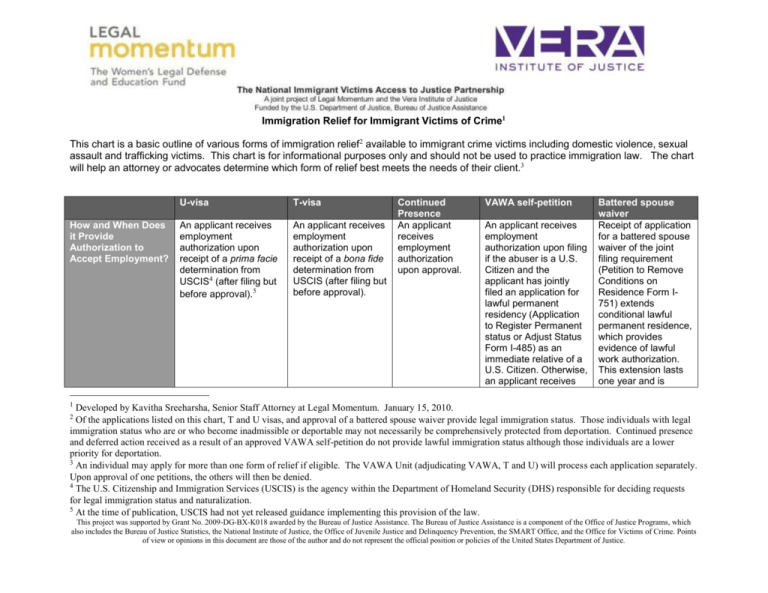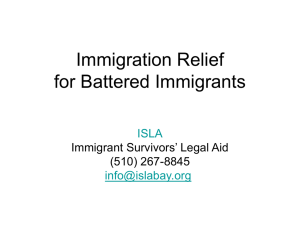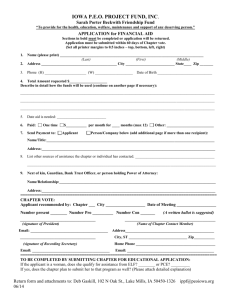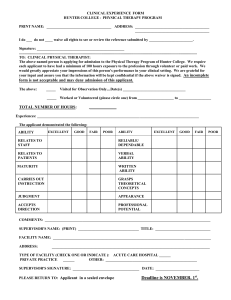3-3-10 chart2 25 10
advertisement

Immigration Relief for Immigrant Victims of Crime1 This chart is a basic outline of various forms of immigration relief2 available to immigrant crime victims including domestic violence, sexual assault and trafficking victims. This chart is for informational purposes only and should not be used to practice immigration law. The chart will help an attorney or advocates determine which form of relief best meets the needs of their client.3 How and When Does it Provide Authorization to Accept Employment? U-visa T-visa An applicant receives employment authorization upon receipt of a prima facie determination from USCIS4 (after filing but before approval).5 An applicant receives employment authorization upon receipt of a bona fide determination from USCIS (after filing but before approval). Continued Presence An applicant receives employment authorization upon approval. VAWA self-petition An applicant receives employment authorization upon filing if the abuser is a U.S. Citizen and the applicant has jointly filed an application for lawful permanent residency (Application to Register Permanent status or Adjust Status Form I-485) as an immediate relative of a U.S. Citizen. Otherwise, an applicant receives Battered spouse waiver Receipt of application for a battered spouse waiver of the joint filing requirement (Petition to Remove Conditions on Residence Form I751) extends conditional lawful permanent residence, which provides evidence of lawful work authorization. This extension lasts one year and is 1 Developed by Kavitha Sreeharsha, Senior Staff Attorney at Legal Momentum. January 15, 2010. Of the applications listed on this chart, T and U visas, and approval of a battered spouse waiver provide legal immigration status. Those individuals with legal immigration status who are or who become inadmissible or deportable may not necessarily be comprehensively protected from deportation. Continued presence and deferred action received as a result of an approved VAWA self-petition do not provide lawful immigration status although those individuals are a lower priority for deportation. 3 An individual may apply for more than one form of relief if eligible. The VAWA Unit (adjudicating VAWA, T and U) will process each application separately. Upon approval of one petitions, the others will then be denied. 4 The U.S. Citizenship and Immigration Services (USCIS) is the agency within the Department of Homeland Security (DHS) responsible for deciding requests for legal immigration status and naturalization. 5 At the time of publication, USCIS had not yet released guidance implementing this provision of the law. 2 This project was supported by Grant No. 2009-DG-BX-K018 awarded by the Bureau of Justice Assistance. The Bureau of Justice Assistance is a component of the Office of Justice Programs, which also includes the Bureau of Justice Statistics, the National Institute of Justice, the Office of Juvenile Justice and Delinquency Prevention, the SMART Office, and the Office for Victims of Crime. Points of view or opinions in this document are those of the author and do not represent the official position or policies of the United States Department of Justice. U-visa T-visa Process The applicant files Uvisa (Form I-918) at the VAWA Unit of Vermont Service Center of USCIS. The applicant files Tvisa (Form I-914) at the VAWA Unit of Vermont Service Center of USCIS. Qualifying Family Beneficiaries (still must potentially meet other requirements) Qualifying family members for victims over 21 include spouses and children under 21. Qualifying family members of victims under 21 include spouses, children, parents, and unmarried siblings under 18. Qualifying family members for victims over 21 include spouses and children under 21, and if facing retaliation parents and unmarried sibling sunder age 18. Qualifying family members of victims under 21 include Continued Presence ICE6 Special Agent in Charge sends to Office of International Affairs’ Law Enforcement Parole Branch, which sends the approval to USCIS to process employment authorization. Qualifying family members for victims over 21 include spouses and children under 21. Qualifying family members of victims under 21 include spouses, children, parent, and unmarried VAWA self-petition Battered spouse waiver employment authorization upon approval. The applicant files the VAWA self-petition (Form I-360) at the VAWA Unit of Vermont Service Center of USCIS. renewable. Children under age 21 at the time of filing. Children who have conditional resident status may apply with a conditional resident parent. However, if the battered immigrant’s child did not receive conditional residency that child cannot obtain legal permanent residence 6 Applicant files the battered spouse waiver (Form I-751) either at the VAWA Unit of Vermont Service Center (USCIS) or at California Service Center of USCIS depending on in which state the applicant resides. Immigration and Customs Enforcement (ICE) is one of two agencies within DHS responsible for immigration enforcement, detention and removal. The other DHS agency with immigration enforcement authority is U.S. Customs and Border Patrol (CBP). 1101 14th Street NW, Suite 300, Washington, DC 20005. T: 202.326.0046 www.legalmomentum.org U-visa Qualifying criminal activity Requirement of applicant’s cooperation with law Qualifying U-visa criminal activity includes but is not limited to domestic violence (including child abuse and elder abuse), sexual assault, and human trafficking. An applicant may be a victim of any qualifying criminal activity.7 An applicant must submit a U-visa certification (Form I-918 T-visa Continued Presence spouses, children, parents, and unmarried siblings under 18. siblings under 18. A qualifying family members may receive parole if that individual faces retaliation as a result of the victim’s cooperation. This protection is only available to victims of a “severe form of trafficking in persons”. This visa is only available to victims of a “severe form of trafficking in persons”. An applicant must submit proof of reasonable Only law enforcement may request that ICE VAWA self-petition Battered spouse waiver through the parent’s battered spouse waiver application. Self-petitioners must be have been subject to battery or extreme cruelty, which includes forms of emotional abuse and does not have to rise to the level of a criminal activity. Battered spouse waiver applicants must have been subject to battery or extreme cruelty, includes forms of emotional abuse and does not have to rise to the level of a criminal activity. None. None. 7 Qualifying criminal activity includes rape, torture, trafficking, incest, domestic violence, sexual assault, abusive sexual contact, prostitution, sexual exploitation, female genital mutilation, being held hostage, peonage, involuntary servitude, slave trade, kidnapping, abduction, unlawful criminal restraint, false imprisonment, blackmail, extortion, manslaughter, murder, felonious assault, witness tampering, obstruction of justice, perjury, solicitation to commit any of the abovementioned crimes, or any similar activity in violation of federal, state, or local criminal law. This list also includes attempts or conspiracy to commit any of the listed activities. 1101 14th Street NW, Suite 300, Washington, DC 20005. T: 202.326.0046 www.legalmomentum.org enforcement Require proof of applicant’s good moral character U-visa T-visa Continued Presence Supplement B) signed by a designated law enforcement officer, judge, prosecutor or other state of federal government official involved in detection, investigation, or prosecution of criminal activity. An applicant may be certified if he or she is a victim of a qualifying criminal activity and has been, is being, or is likely to be helpful in an investigation or prosecution. Certification is encouraged as soon as possible and certifying helpfulness does not hinge on a case proceeding beyond detection or investigation of a crime. No. cooperation with a trafficking investigation or prosecution and may submit a law enforcement certification on Form I-914 Supplement B as proof. The law enforcement certification is not required. Proof of continued presence may be submitted as secondary evidence. Certification is encouraged as soon as possible and certifying cooperation does not hinge on a case proceeding beyond detection or investigation of a crime. request continued presence for someone who is cooperating with an investigation or prosecution. A request for continued presence is encouraged as soon as possible and does not hinge on a case proceeding beyond detection or investigation of a crime. Proof of good moral character is not required for the Tvisa application but is required to be granted lawful No. VAWA self-petition Battered spouse waiver Proof of good moral character is required to self-petition. No 1101 14th Street NW, Suite 300, Washington, DC 20005. T: 202.326.0046 www.legalmomentum.org U-visa T-visa Requirement that applicant faces extreme hardship if returning to home country Other Requirements of the Applicant There is no requirement of extreme hardship. Caps Cap of 10,000 for each fiscal year. USCIS has never reached the cap The applicant suffered substantial physical or mental abuse as a result of the qualifying crime. permanent residency. An applicant must prove “extreme hardship involving unusual and severe harm upon removal.” The applicant is physically present in the U.S. on account of trafficking. Cap of 5,000 visas for each fiscal year. USCIS has never Continued Presence VAWA self-petition Battered spouse waiver There is no requirement of extreme hardship. No. No. None. The abuser must be the spouse, intended spouse, have been a spouse within 2 years of filing, parent (or step parent) of the victim.8 The abuser must be a Lawful Permanent Resident or a U.S. Citizen. For victims whose abuser is a spouse, the victim must also show good faith marriage. The applicant must also show he or she resided with the abuser at some point during the marriage. No cap. The applicant must be a conditional permanent resident to apply. The applicant must also demonstrate that the applicant married the abuser spouse in good faith. No cap. 8 No cap. Elder abuse victims abused by their over 21 year old adult U.S. Citizen abusive sons or daughters are also statutorily eligible to self-petition although at the date of publication, no regulations or guidance has been published to implement this provision. 1101 14th Street NW, Suite 300, Washington, DC 20005. T: 202.326.0046 www.legalmomentum.org Inadmissibility Waivers Available So That The Victim Can Receive Lawful Permanent Residency U-visa T-visa but they may in FY ’10. reached the cap and is unlikely to reach it in the upcoming fiscal years. There is an exception to the public charge grounds of inadmissibility. A discretionary waiver available for other grounds of inadmissibility if inadmissibility is incident to the victimization. No waiver is available if inadmissiblity is because of Nazi persecution, genocide, torture or extrajudicial killing; security-related grounds, international child abduction, or renunciation of citizenship to avoid taxation. Discretionary waiver of inadmissibility available if it is in the public or national interest. No waiver is available for participants in Nazi persecution, genocide, torture or extrajudicial killing. Continued Presence VAWA self-petition Battered spouse waiver Continued presence does not lead to lawful permanent residency so waivers are not applicable. Waivers of inadmissibility not needed for VAWA selfpetitioning process. However, the good moral character selfpetitioning requirement is interpreted to require that the victim demonstrate that a waiver would be available and the act is connected to the “abuse”. For purposes of lawful permanent residency there are a range of inadmissibility waivers that are available specifically for VAWA self-petitioners. Eligibility requirements for each waiver vary depending on the grounds. Battered spouse waiver applicants have already been deemed to be admissible when they were granted conditional residency. However, as with any lawful permanent resident, any acts triggering a ground of inadmissibility or deportability could result in an applicant being placed in removal proceedings. 1101 14th Street NW, Suite 300, Washington, DC 20005. T: 202.326.0046 www.legalmomentum.org U-visa T-visa Continued Presence VAWA self-petition Battered spouse waiver Processing Times Varies between 3-18 months.9 Varies between 3-18 months.10 Approximately 1 month. Varies between 3-18 months.11 Renewal U-visa status may be extended if the U-visa holder is certified by law enforcement to be required for an investigation or prosecution, exceptional circumstances, or because a U-visa holder was unable to apply for lawful permanent residence due a DHS delay in issuing regulations. A U-visa holder can apply for lawful permanent residence if there is no affirmative evidence that the victim unreasonably refused to cooperate in an investigation or T-visa status may be extended if the T-visa holder is certified by law enforcement to be required for an investigation or prosecution, exceptional circumstances, or because a T-visa holder was unable to apply for lawful permanent residence due a DHS delay in issuing regulations. A T-visa holder can apply for lawful permanent residence if the applicant has complied with reasonable requests in the investigation or prosecution (or was Continued presence may be extended if it is requested by federal law enforcement. A VAWA self-petition (Form I-360) approval provides deferred action that protects the victim from deportation and lasts for one year and may be renewed until the self-petitioner is eligible to apply for lawful permanent residence. Varies between 6-24 months (depending on the service center processing the case). A battered spouse waiver (Form I-751) approval extends the applicant’s conditional permanent residence for one year. It may be extended annually until the battered spouse waiver application is adjudicated. No. Yes. If the abuser is a U.S. Citizen, the selfpetitioner can simultaneously file the VAWA self-petition and the application for lawful permanent residency. If the Leads to Lawful Permanent Residence 9 Consult with Legal Momentum to determine current processing times. Consult with Legal Momentum to determine current processing times. 11 Consult with Legal Momentum to determine current processing times. 10 1101 14th Street NW, Suite 300, Washington, DC 20005. T: 202.326.0046 www.legalmomentum.org Yes, the approval of the battered spouse waiver grants lawful permanent residence. Public Benefits 12 U-visa T-visa prosecution, the applicant has maintained continuous presence in the United States for three years, and there is justification to grant permanent residence based on humanitarian grounds, family unity, or public interest. under 18 or would suffer extreme hardship), has maintained continuous presence in the United States for three years (or qualifies to apply earlier because the investigation or prosecution is complete), has good moral character, and is admissible or qualifies for a waiver. U-visa victims are not qualified immigrants eligible to receive federal public benefits or federal means tested pubic benefits. In some states U-visa recipients are able to receive some state funded benefits because they are lawfully present.12 Approval of a T-visa makes the victim a qualified immigrant, bona fide determination grants refugee benefits as an HHS certified victim of a severe form of trafficking. Continued Presence VAWA self-petition Battered spouse waiver abuser is a lawful permanent resident, the self-petitioner will receive an approved self-petition, deferred action and work authorization, but must wait for a family preference visa to become available. This can take up to or more than 7 years, but the victim will eventually be eligible for lawful permanent residency. Refugee benefits as an HHS certified victim of a severe form of trafficking. VAWA self-petitioners who receive a prima facie notice are qualified immigrants eligible to receive federal public benefits. Self-petitioners who entered the U.S. after 8/22/96 must wait 5 years before they can access federal means tested public benefits (e.g. TANF, Food State specific public benefits information is available through the National Immigration Law Center at www.nilc.org. 1101 14th Street NW, Suite 300, Washington, DC 20005. T: 202.326.0046 www.legalmomentum.org Conditional residents filing battered spouse waivers are qualified immigrants eligible to receive federal public benefits. Those who entered the U.S. after 8/22/96 must wait 5 years before they can access federal means tested public benefits (e.g. TANF, Food Stamps, SSI, U-visa T-visa Continued Presence VAWA self-petition Battered spouse waiver Stamps, SSI, Medicaid). Selfpetitioners subject to the 5 year bar may be able to receive state funded benefits. 13 Medicaid). Battered spouse waiver applicants subject to the 5 year bar may be able to receive state funded benefits. 14 Certified by HHS as a victim of a severe form of trafficking in persons 13 14 No. Yes upon receipt from USCIS of bona fide application determination. Yes. No. State specific public benefits information is available through the National Immigration Law Center at www.nilc.org. State specific public benefits information is available through the National Immigration Law Center at www.nilc.org. 1101 14th Street NW, Suite 300, Washington, DC 20005. T: 202.326.0046 www.legalmomentum.org No.






